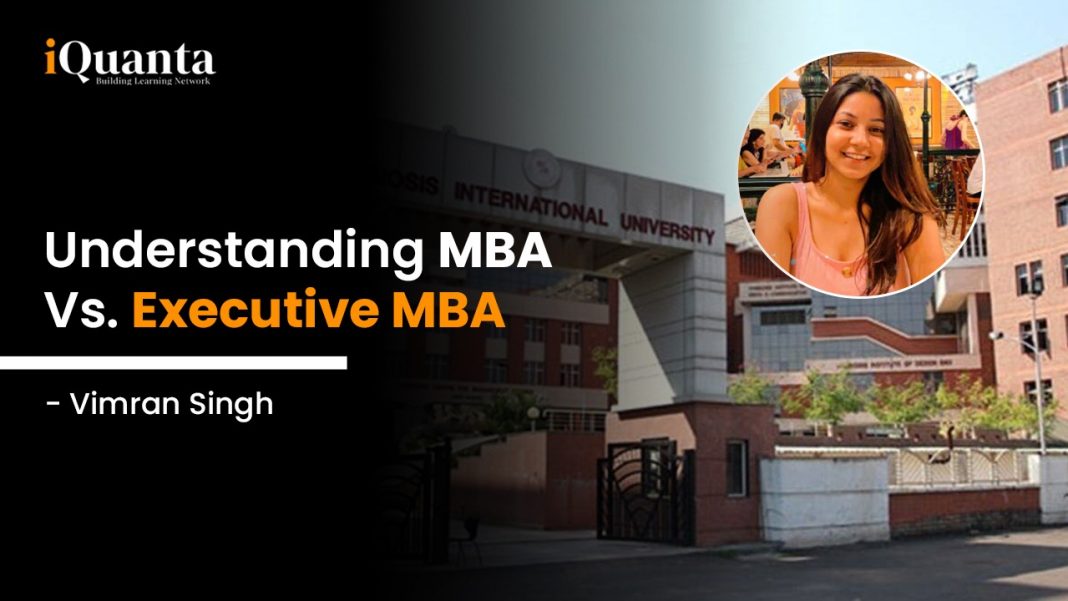MBA Vs Executive MBA
- Vimran Singh (Executive MBA Student at SIBM Pune)
MBA vs Executive MBA, which one should you prefer and why? In this blog, we will help you decide whether to pursue an MBA or EMBA, considering what you are currently doing, studying or working?
For many people, the choice between a normal full MBA and an executive MBA (EMBA) comes down to how best to balance classes with the responsibilities of a day job. Furthermore, many mid-career professionals will pick the executive MBA since they do not want or cannot stop working, and the program is better suited to their time of life.
Apart from the distinction between full-time and part-time programs, the fundamental difference between the two types of programs is the less intense experience of completing an executive MBA. While EMBA students will still learn a lot and network, there is much to be said about the full-time immersion of a typical MBA program. So, if both the MBA and the EMBA are certified, which is more remarkable and the better option?
It is critical to understand that neither an MBA nor an EMBA guarantees career stability. Both, however, should provide a student with essential skill sets, a valuable business network, and the prestige that comes with a higher degree; the choice ultimately comes down to the student’s flexibility in time and money.
MBA Vs. EMBA Highlights
- The primary distinction between an MBA and an Executive MBA is the amount of engagement in the graduate school experience and the catering of programs to a more experienced set of students.
- Full-time MBA students have full-day, rigorous schedules, making it difficult to work outside of the program.
- Executive MBA students work full-time and often attend classes on Fridays and weekends, which might result in less engagement on campus.
A company often covers the majority, if not all, of the tuition fees for an EMBA. After all, they gain from the new abilities that their managers are acquiring! EMBA candidates, on the other hand, earn a full income in addition to someone else funding your tuition. In terms of location, with an MBA, you may take classes at any institution you like. If you’re working, your options for an EMBA are restricted to local colleges in the region.
EMBA vs. MBA Program Comparison
EMBA and MBA programs often cover the same amount of curriculum in the same two years. One significant distinction is how the coursework is delivered.
Full-time MBA candidates attend school full-time, may live on or near campus, and typically do not have time to work full-time while earning their degree.
To accommodate candidates with full-time employment, EMBA schools typically arrange courses outside of normal business hours, on Friday nights and weekends. Many programs will also need pre-planned week-long seminars or intensive activities a few times over the program’s duration. Candidates may live nearby or commute, but they will hardly reside on campus.
EMBA classes are typically more intensive than MBA classes for two reasons:
- The condensed structure means more information is packed into each class.
- EMBA candidates typically enter their programs with significantly more work experience, naturally generating higher-level class discussions.
Is an EMBA worth the same as a full-time MBA?
Because many colleges award the same degree to both EMBA and MBA graduates, the two degrees will often appear the same on a résumé and have the same worth on paper.
One possible distinction is the network students build during their program. Because they are more condensed, EMBA programs prefer to divide its students into cohorts. As an EMBA student, you may take classes with the same group of people throughout your degree program. Full-time MBA programs are more flexible since there are more class alternatives and a greater possibility for personalization.
Furthermore, because EMBA applicants are frequently aiming to advance in their current area of work, the career services available to EMBA candidates may differ from those available to MBA candidates. MBA candidates may attend on-campus career fairs or recruitment events focused on people in their early careers seeking new opportunities. EMBA applicants are more likely to get services aimed at later-stage career progression, such as executive coaching.
How to choose between an MBA and an EMBA?
The following are some key points to keep in mind when you make your decision:
- In contrast to EMBAs, where students attend sessions in the evenings and on weekends, MBA classes normally follow a set timetable.
- EMBA students may effortlessly mix study and work because of the class flexibility.
- When compared to EMBA students, MBA students have a larger selection of optional courses.
- Because EMBA students often do not take electives, an EMBA may be completed in the same length of time as an MBA.
Both study programs provide you with distinct credibility in the business world, allowing you to discover career opportunities in a variety of industries. MBAs and Executive MBAs are recognized globally, so you are not restricted to obtaining work in your own country.
If you want a structured course to prepare for NMAT & SNAP 2022-23, visit the link below.
To become a part of India’s largest MBA exam preparation community, join the group linked below




